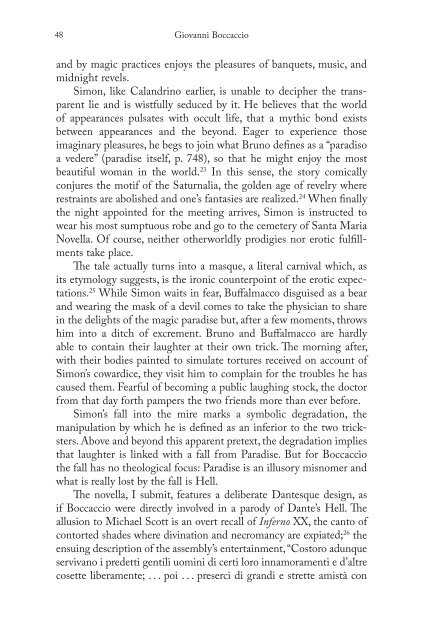Blooms Literary Themes - THE TRICKSTER.pdf - ymerleksi - home
Blooms Literary Themes - THE TRICKSTER.pdf - ymerleksi - home
Blooms Literary Themes - THE TRICKSTER.pdf - ymerleksi - home
Create successful ePaper yourself
Turn your PDF publications into a flip-book with our unique Google optimized e-Paper software.
48<br />
Giovanni Boccaccio<br />
and by magic practices enjoys the pleasures of banquets, music, and<br />
midnight revels.<br />
Simon, like Calandrino earlier, is unable to decipher the transparent<br />
lie and is wistfully seduced by it. He believes that the world<br />
of appearances pulsates with occult life, that a mythic bond exists<br />
between appearances and the beyond. Eager to experience those<br />
imaginary pleasures, he begs to join what Bruno defi nes as a “paradiso<br />
a vedere” (paradise itself, p. 748), so that he might enjoy the most<br />
beautiful woman in the world. 23 In this sense, the story comically<br />
conjures the motif of the Saturnalia, the golden age of revelry where<br />
restraints are abolished and one’s fantasies are realized. 24 When fi nally<br />
the night appointed for the meeting arrives, Simon is instructed to<br />
wear his most sumptuous robe and go to the cemetery of Santa Maria<br />
Novella. Of course, neither otherworldly prodigies nor erotic fulfi llments<br />
take place.<br />
Th e tale actually turns into a masque, a literal carnival which, as<br />
its etymology suggests, is the ironic counterpoint of the erotic expectations.<br />
25 While Simon waits in fear, Buff almacco disguised as a bear<br />
and wearing the mask of a devil comes to take the physician to share<br />
in the delights of the magic paradise but, after a few moments, throws<br />
him into a ditch of excrement. Bruno and Buff almacco are hardly<br />
able to contain their laughter at their own trick. Th e morning after,<br />
with their bodies painted to simulate tortures received on account of<br />
Simon’s cowardice, they visit him to complain for the troubles he has<br />
caused them. Fearful of becoming a public laughing stock, the doctor<br />
from that day forth pampers the two friends more than ever before.<br />
Simon’s fall into the mire marks a symbolic degradation, the<br />
manipulation by which he is defi ned as an inferior to the two tricksters.<br />
Above and beyond this apparent pretext, the degradation implies<br />
that laughter is linked with a fall from Paradise. But for Boccaccio<br />
the fall has no theological focus: Paradise is an illusory misnomer and<br />
what is really lost by the fall is Hell.<br />
Th e novella, I submit, features a deliberate Dantesque design, as<br />
if Boccaccio were directly involved in a parody of Dante’s Hell. Th e<br />
allusion to Michael Scott is an overt recall of Inferno XX, the canto of<br />
contorted shades where divination and necromancy are expiated; 26 the<br />
ensuing description of the assembly’s entertainment, “Costoro adunque<br />
servivano i predetti gentili uomini di certi loro innamoramenti e d’altre<br />
cosette liberamente; . . . poi . . . preserci di grandi e strette amistà con

















